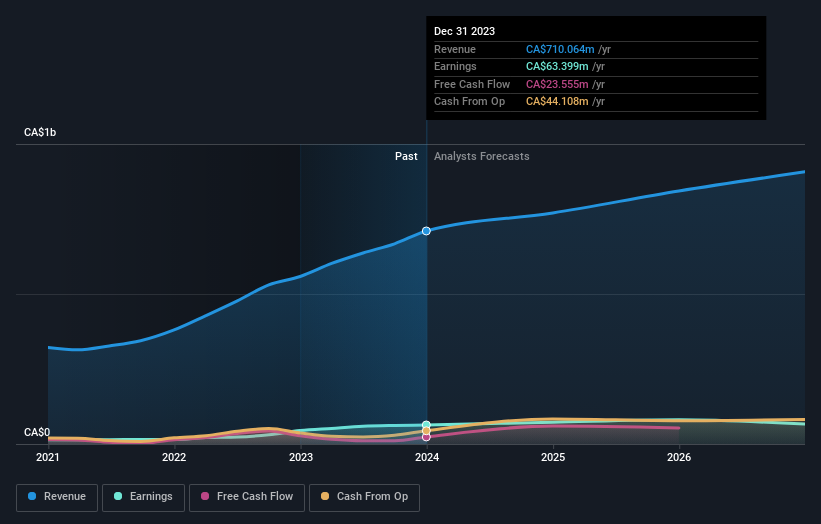Hammond Power Solutions Inc.'s (TSE:HPS.A) stock price dropped 12% last week; individual investors would not be happy
Key Insights
Significant control over Hammond Power Solutions by individual investors implies that the general public has more power to influence management and governance-related decisions
50% of the business is held by the top 16 shareholders
To get a sense of who is truly in control of Hammond Power Solutions Inc. (TSE:HPS.A), it is important to understand the ownership structure of the business. The group holding the most number of shares in the company, around 46% to be precise, is individual investors. That is, the group stands to benefit the most if the stock rises (or lose the most if there is a downturn).
Following a 12% decrease in the stock price last week, individual investors suffered the most losses, but insiders who own 32% stock also took a hit.
Let's take a closer look to see what the different types of shareholders can tell us about Hammond Power Solutions.
See our latest analysis for Hammond Power Solutions
What Does The Institutional Ownership Tell Us About Hammond Power Solutions?
Institutions typically measure themselves against a benchmark when reporting to their own investors, so they often become more enthusiastic about a stock once it's included in a major index. We would expect most companies to have some institutions on the register, especially if they are growing.
We can see that Hammond Power Solutions does have institutional investors; and they hold a good portion of the company's stock. This implies the analysts working for those institutions have looked at the stock and they like it. But just like anyone else, they could be wrong. When multiple institutions own a stock, there's always a risk that they are in a 'crowded trade'. When such a trade goes wrong, multiple parties may compete to sell stock fast. This risk is higher in a company without a history of growth. You can see Hammond Power Solutions' historic earnings and revenue below, but keep in mind there's always more to the story.
Hammond Power Solutions is not owned by hedge funds. Looking at our data, we can see that the largest shareholder is William Hammond with 31% of shares outstanding. FMR LLC is the second largest shareholder owning 7.5% of common stock, and Pembroke Management Ltd. holds about 2.2% of the company stock.
A closer look at our ownership figures suggests that the top 16 shareholders have a combined ownership of 50% implying that no single shareholder has a majority.
While studying institutional ownership for a company can add value to your research, it is also a good practice to research analyst recommendations to get a deeper understand of a stock's expected performance. Quite a few analysts cover the stock, so you could look into forecast growth quite easily.
Insider Ownership Of Hammond Power Solutions
The definition of company insiders can be subjective and does vary between jurisdictions. Our data reflects individual insiders, capturing board members at the very least. Management ultimately answers to the board. However, it is not uncommon for managers to be executive board members, especially if they are a founder or the CEO.
Insider ownership is positive when it signals leadership are thinking like the true owners of the company. However, high insider ownership can also give immense power to a small group within the company. This can be negative in some circumstances.
Our information suggests that insiders maintain a significant holding in Hammond Power Solutions Inc.. It is very interesting to see that insiders have a meaningful CA$520m stake in this CA$1.6b business. Most would say this shows a good degree of alignment with shareholders, especially in a company of this size. You can click here to see if those insiders have been buying or selling.
General Public Ownership
The general public-- including retail investors -- own 46% stake in the company, and hence can't easily be ignored. This size of ownership, while considerable, may not be enough to change company policy if the decision is not in sync with other large shareholders.
Next Steps:
While it is well worth considering the different groups that own a company, there are other factors that are even more important. Case in point: We've spotted 2 warning signs for Hammond Power Solutions you should be aware of.
Ultimately the future is most important. You can access this free report on analyst forecasts for the company.
NB: Figures in this article are calculated using data from the last twelve months, which refer to the 12-month period ending on the last date of the month the financial statement is dated. This may not be consistent with full year annual report figures.
Have feedback on this article? Concerned about the content? Get in touch with us directly. Alternatively, email editorial-team (at) simplywallst.com.
This article by Simply Wall St is general in nature. We provide commentary based on historical data and analyst forecasts only using an unbiased methodology and our articles are not intended to be financial advice. It does not constitute a recommendation to buy or sell any stock, and does not take account of your objectives, or your financial situation. We aim to bring you long-term focused analysis driven by fundamental data. Note that our analysis may not factor in the latest price-sensitive company announcements or qualitative material. Simply Wall St has no position in any stocks mentioned.

 Yahoo Finance
Yahoo Finance 

